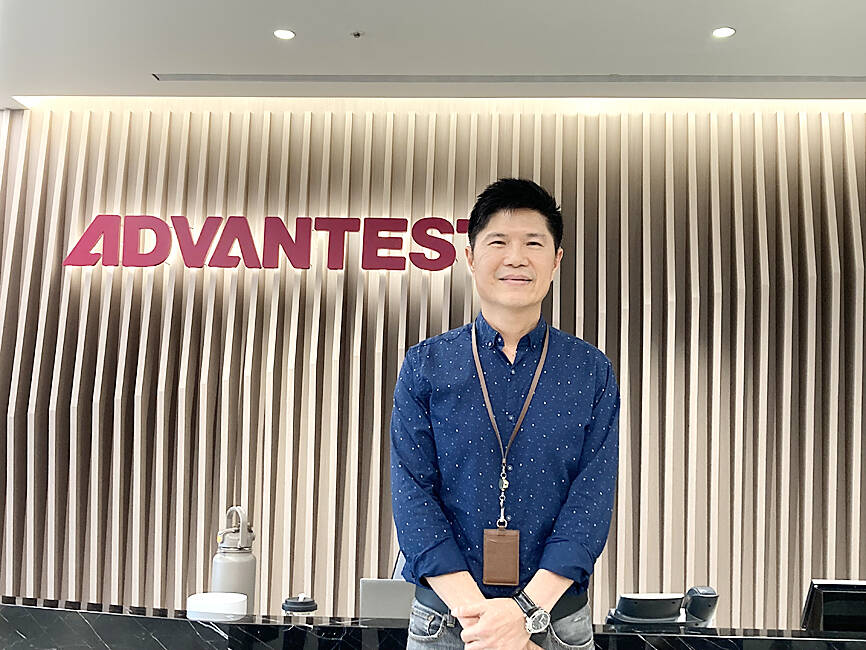Advantest Corp, the world’s largest chip testing equipment supplier, yesterday said that stronger-than-expected demand from Taiwan Semiconductor Manufacturing Co (台積電) has stretched to far longer than the expected six months, driven by a surge in demand for artificial intelligence (AI) and high-performance-computing (HPC) applications.
Normally lead times range from three to four months, but as a majority of AI and HPC chips are packaged using advanced packaging technology, chip-on-wafer-on-substrate, it requires a longer and more complex testing process to ensure every semiconductor die works well before being packaged together, Advantest said.
As a result, demand for Advantest’s equipment is running high, the company said.

Photo: Lisa Wang, Taipei Times
Taiwan is a major consumer of such testing equipment because it plays a major role in supplying AI and HPC chips.
Advantest holds a greater market share in the AI and HPC chip testing equipment market, compared with its 56 percent share of the global testing equipment market.
“The lead time is a critical issue now. Demand has greatly exceeded our original expectations,” Advantest chairman Alex Wu (吳萬錕) told reporters yesterday on the sidelines of a media briefing celebrating the company’s new Hsinchu headquarters.
“We have our hands full now,” Wu said. “We will do our best to satisfy customers’ demand. We hope to shorten our lead times a bit by the end of this year.”
Taiwan is the company’s fastest-growing market, even though China has become its biggest market due to growing demand for mature equipment, Wu said.
Advantest also expects to see an increase in demand for its memorychip testing equipment in Taiwan as local memorychip makers seek to tap into a more affordable high-bandwidth segment, with devices such as PCs and smartphones being equipped with more AI functions, Wu said.
Advantest counts ASE Technology Holding Co (日月光投控), the world’s biggest chip packager, King Yuan Electronics Co (京元電子), Nvidia Inc and Advanced Micro Devices Inc among its customers.
To cope with rising demand, Advantest is expanding its headcount and facilities in Taiwan.
The new headquarters can house at least 400 employees, Wu said.
The company currently employees more than 300 people in Hsinchu.
Advantest has spent NT$200 million (US$6.1 million) on its new headquarters in the Tai Yuen Hi-Tech Industrial Park (台元科技園區), which is also home to semiconductor material analysis company Materials Analysis Technology Inc (閎康) and display drive IC designer Novatek Microelectronics Corp (聯詠).

When an apartment comes up for rent in Germany’s big cities, hundreds of prospective tenants often queue down the street to view it, but the acute shortage of affordable housing is getting scant attention ahead of today’s snap general election. “Housing is one of the main problems for people, but nobody talks about it, nobody takes it seriously,” said Andreas Ibel, president of Build Europe, an association representing housing developers. Migration and the sluggish economy top the list of voters’ concerns, but analysts say housing policy fails to break through as returns on investment take time to register, making the

NOT TO WORRY: Some people are concerned funds might continue moving out of the country, but the central bank said financial account outflows are not unusual in Taiwan Taiwan’s outbound investments hit a new high last year due to investments made by contract chipmaker Taiwan Semiconductor Manufacturing Co (TSMC, 台積電) and other major manufacturers to boost global expansion, the central bank said on Thursday. The net increase in outbound investments last year reached a record US$21.05 billion, while the net increase in outbound investments by Taiwanese residents reached a record US$31.98 billion, central bank data showed. Chen Fei-wen (陳斐紋), deputy director of the central bank’s Department of Economic Research, said the increase was largely due to TSMC’s efforts to expand production in the US and Japan. Investments by Vanguard International

WARNING SHOT: The US president has threatened to impose 25 percent tariffs on all imported vehicles, and similar or higher duties on pharmaceuticals and semiconductors US President Donald Trump on Wednesday suggested that a trade deal with China was “possible” — a key target in the US leader’s tariffs policy. The US in 2020 had already agreed to “a great trade deal with China” and a new deal was “possible,” Trump said. Trump said he expected Chinese President Xi Jinping (習近平) to visit the US, without giving a timeline for his trip. Trump also said that he was talking to China about TikTok, as the US seeks to broker a sale of the popular app owned by Chinese firm ByteDance Ltd (字節跳動). Trump last week said that he had

STRUGGLING TO SURVIVE: The group is proposing a consortium of investors, with Tesla as the largest backer, and possibly a minority investment by Hon Hai Precision Nissan Motor Co shares jumped after the Financial Times reported that a high-level Japanese group has drawn up plans to seek investment from Elon Musk’s Tesla Inc to aid the struggling automaker. The group believes the electric vehicle (EV) maker is interested in acquiring Nissan’s plants in the US, the newspaper reported, citing people it did not identify. The proposal envisions a consortium of investors, with Tesla as the largest backer, but also includes the possibility of a minority investment by Hon Hai Precision Industry Co (鴻海精密) to prevent a full takeover by the Apple supplier, the report said. The group is